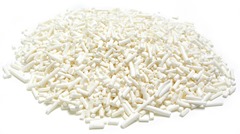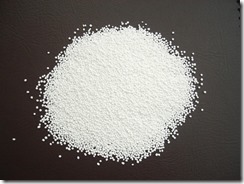- How we can help you?
- 0086-21-50762180
- info(at)sunergyltd.com
Aspartame Granular 20-60 mesh; 60-100 mesh; 100 mesh; High Density Powder 100-200 mesh; HDP Powder; 300mesh
2018-08-27Acesulfame-K, 30-100mesh FCCIV 200 times sweetener
2018-08-29Potassium sorbate Granular, Sphere, Powder form, FCC manufacturer China, preservative, food grade, buy
|
CHEMICAL FORMULA: C6H7KO2 |
CAS NO.:590-00-1/ 24634-61-5 |
|
RELATIVE MOLECULAR MASS:150.22 |
E NUMBER: E 202 |
|
EINECS NUMBER: 246-376-1 |
DESCRIPTION: Potassium Sorbate occurs as white to off white crystals, crystalline powder, or pellets. It decomposes at about 270°. Potassium Sorbate is mainly used as preservatives in Food. Potassium Sorbate can restrain effectively the activity of mould, yeast and aerophile bacteria. Restrain growth and reproduction of the pernicious micro oraganism as pseudomonas, staphylococcus salmonella action to restrain growth is more powerful than killing. Potassium Sorbate occurs as white to light yellow brown flaky crystals, crystalline powder or granules. It is odorless or has a slight odor.
FUNCTION: Antimicrobial agent; preservative.
SHILF LIFE: 2 YEARS
|
ITEM |
UNIT |
STANDARD |
|
Appearance |
– |
White Granular or Powder |
|
Assay(C6H7O2K) |
% |
99.0%-101.0% |
|
Acidity or Alkalinity (as C6H8O2 or K2CO3) |
% |
?1.0% |
|
Loss on drying (105°C 3 hours) |
% |
?1.0% |
|
PH(10% solution) |
– |
8.5-10.5 |
|
Aldehydes(as HCHO) |
% |
?0.1% |
|
Melting point |
°C |
133-135°C |
|
Heavy Metal(as Pb) |
PPM |
?10 PPM |
|
Mercury(Hg) |
mg/kg |
?1mg/kg |
|
Arsenic(as As) |
PPM |
?2 ppm |
|
Lead(Pb) |
PPM |
?5ppm |
|
Clarify |
– |
Conform to FCC IV |
|
Sulphate |
% |
?0.038 |
|
Chloride |
% |
?0.018 |
|
Aldehyde |
% |
?0.1 |
|
Lead |
Mg/kg |
?2 |
|
Cu |
Mg/kg |
?1 |
|
Zn |
Mg/kg |
?1 |
|
/25g |
NEGATIVE |
|
|
Yeasts |
CFU/g |
<10 |
|
Moulds |
CFU/g |
<10 |
|
Aerobic plate count |
CFU/g |
<10 |
|
Excherichia coli |
MPN/g |
NEGATIVE |
|
Conclusion |
The quality of this batch conforms with the FCC. |
PACKAGING: Packaging is compliant with regulations for materials intended to come into contact with food, 25kg/cartons
STORAGE: Store under dry and cool condition, and keep product air-tight.
USE LEVEL OF POTASSIUM SORBATE:
Potassium Sorbate should only be used for the following food item. The usage as sorbic acid should be
1. Cheese: Not be more than 3.0 g/kg (if it is used with propionic acid, sodium propionate, and calcium propionate, the total usage of propionic acid, sorbic acid should not be more than 3.0 g/kg.)
2. Meat products including poultry and game (packaged meat, marinated meat, crushed and meat products including poultry and game, processed rib products, bouillons and broth, beef tallow, and lard are excluded.), whale meat products, processed fish and fish product including mullusks, crustaceans and echinoderms, sea urchin products, peanut butter, cheese analogue : Not be more than 2.0 g/kg.
3. Salted and fermented seafood (with not more than 8% as salt), fermented soy bean paste, fermented hot pepper soybean paste, chunjang, cheonggukjang (limited to non dried products.), mixed bean paste, dried sea food, red bean paste, salted food, aloe gel concentrate, processed aloe gel products (edible aloe gel included), flour paste (Sugar, fats and oils, beef tallow, lard, powdered milk, or eggs are added to main ingredients such as wheat flour, starch, nuts, or its processed products, cocoa, chocolate, coffee, fruit juice, potatoes and pulses, legumes, or vegetables. Above foods are pasteurized and formed into a paste type), dressing, concentrated pineapple juice, Mango Chutney (after peeling mango, it is sliced, diced, or crushed, which is mixed with fruit vegetables, vinegar, garlic, etc and processed by heating) : Not be more than 1.0 g/kg.
4. Jams : Not be more than 1.0 g/kg (if it is used with benzoic acid, sodium benzoate, potassium benzoate, calcium benzoate, methyl p-hydroxybenzoate, ethyl p-hydroxybenzoate, propyl p-hydroxybenzoate, propionic acid, sodium propionate, and calcium propionate, the total consumption of sorbic acid, benzoic acid, p-hydroxybenzoic acid, and propionic acid should not be more than 1.0 g/kg)
5. Dried fruits, tomato ketchup, vinegar-preserved food, sugared food (sugared dried food excluded): Not be more than 0.5 g/kg.
6. Fermented dairy-based drinks (pasteurized beverages are excluded): Not be more than 0.05 g/kg.
7. Fruit Liquor: Not be more than 0.2 g/kg.
8. Margarine: Not be more than 1.0 g/kg. (if it is used with benzoic acid, sodium benzoate, potassium benzoate, and calcium benzoate, the sum of sorbic acid and benzoic acid should not be more than 2.0 g/kg and the usage of benzoic acid should not be more than 1.0 g/kg)
9. Low fat margarine (low fat spread): not be more than 2.0 g/kg (if it is used with benzoic acid, sodium benzoate, potassium benzoate, and calcium benzoate, the sum of sorbic acid and benzoic acid should not be more than 2.0 g/kg and the usage of benzoic acid should not be more than 1.0 g/kg)
10. Processed saccharide products (limited to syrup or paste to be sprayed or packed into dried cookies, loaf bread, ice cream, and other food items.): Not be more than 1.0 g/kg.
HEALTH AND SAFETY INFORMATION:
Potassium Sorbate is one kind of nonsaturated fatty acid compounds. It can be absorbed by human body rapidly, then decomposed into CO2 and H2O, no remaining in body.
1. ADI 0-25mg/kg (based on sorbic acid FAO/WHO 1994)
2. LD50 4920mg/kg (large mouse by mouth)
3. GRAS (FDA, 182.3640 1994)
4. Its toxicity only 1/12 times table salts and 1/40 times sodium benzoate.



